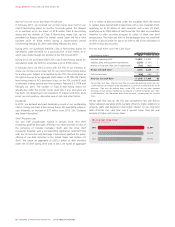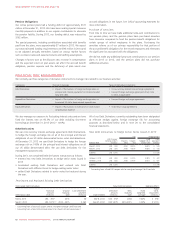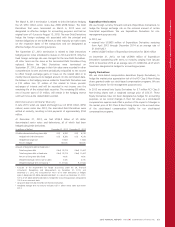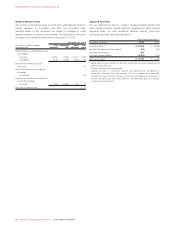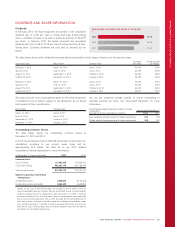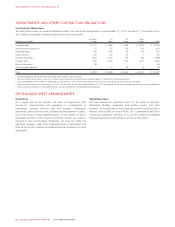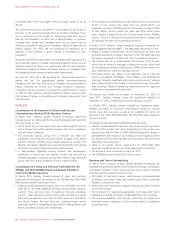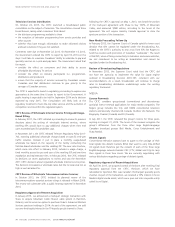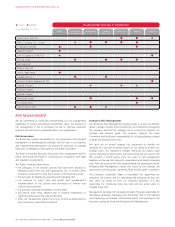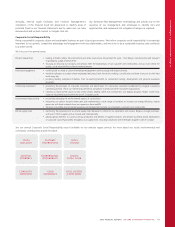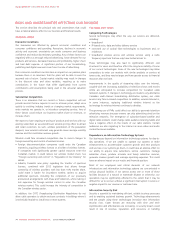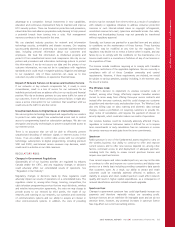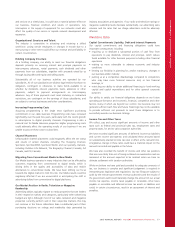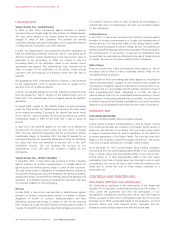Rogers 2013 Annual Report Download - page 74
Download and view the complete annual report
Please find page 74 of the 2013 Rogers annual report below. You can navigate through the pages in the report by either clicking on the pages listed below, or by using the keyword search tool below to find specific information within the annual report.MANAGEMENT’S DISCUSSION AND ANALYSIS
Television Services Distribution
On October 24, 2013, the CRTC launched a broad-based public
consultation on the subject of television. The consultation covered three
broad themes, asking what consumers think about:
• the television programming available to them
• the reception of television programming from service providers and
other sources
• whether they have enough information to make informed choices
and seek solutions if they are not satisfied.
Comments were due on November 22, 2013. On November 14, 2013,
the Government ordered the CRTC to report by April 30, 2014 on the
steps it will take to maximize Canadians’ ability to subscribe to pay and
specialty services on a pick-and-pay basis. The Government asked that
the report:
• consider the effect on consumers and their ability to access
affordable discretionary TV services
• consider the effect on industry participants (i.e. programmers,
distributors and producers)
• ensure that the majority of services received by Canadians remain
Canadian and that distributors continue to give priority to the
carriage of Canadian services.
The CRTC is expected to launch a regulatory proceeding to explore new
approaches at the same time it issues its report to the Government. A
public hearing is expected to be held in September 2014 and a decision
expected by early 2015. The Consultation will likely look at the
regulatory treatment of over-the-top video services and the evolution of
competitive services within the regulated system.
CRTC Review of Wholesale Internet Service Pricing and Usage-
Based Billing
In February 2011, the CRTC initiated a proceeding to review its previous
decisions about the pricing of wholesale Internet services, where
reselling ISPs would have to pay additional charges when their end
users exceeded specific bandwidth caps.
In November 2011, the CRTC released Telecom Regulatory Policy 2011-
703, rejecting additional wholesale charges based on specific end-user
traffic volumes. Instead, it put in place a monthly usage-based
wholesale fee based on the capacity of the facility connecting the
facilities-based wholesaler and the reselling ISP. The new rate structure,
which came into effect in February 2012, includes a usage charge, a
fixed monthly access fee per end user of the reselling ISP and one-time
installation and maintenance fees. In February 2013, the CRTC released
its decisions on seven applications to review and vary the November
2011 CRTC decisions about regulated wholesale Internet service prices.
The decisions increased our wholesale rates, but the increase was not as
high as we had asked for.
CRTC Review of Wholesale Telecommunications Services
In October 2013, the CRTC initiated its planned review of the
telecommunications essential services rulings it released in March 2008.
The review will culminate with a public hearing expected in November
2014.
Regulatory Approval of Recent Acquisition
In January 2013, we announced a multi-part strategic transaction with
Shaw to acquire Mountain Cable (Shaw’s cable system in Hamilton,
Ontario), and to secure an option to purchase Shaw’s Advanced Wireless
Services spectrum holdings in 2014. As part of the agreement, we sold
our one-third equity interest in the TVtropolis special channel to Shaw.
Following the CRTC’s approval on May 1, 2013, we closed the portion
of the multi-part agreement with Shaw to buy 100%of Mountain
Cable, and advanced $398 million, according to the terms of the
agreement. We will require Industry Canada approval to close the
spectrum portion of the transaction.
New Media Proceeding Follow-Up
In February 2012, the Supreme Court of Canada upheld a lower court
decision that ISPs cannot be regulated under the Broadcasting Act,
related to the CRTC’s authority to levy a tax from ISPs like Rogers to
fund the creation and promotion of Canadian “webisodes”. The result
is that ISPs, when offering connectivity to television and movie websites,
are not considered to be acting as broadcasters and cannot be
regulated under the Broadcasting Act.
Review of Broadcasting Regulations
In November 2012, the Supreme Court ruled that the CRTC did
not have the authority to implement the value for signal regime
outlined in Broadcasting Decision 2010-167, consistent with our
recommendations. As a result, broadcasters will continue to charge
rates to broadcasting distribution undertakings under the existing
regulatory framework.
MEDIA
Licence Renewals
The CRTC considers group-based (conventional and discretionary
specialty) licence renewal applications for major media companies. The
Rogers group includes the City and OMNI conventional television
stations and specialty channels G4 Canada, Outdoor Life Network, The
Biography Channel (Canada) and FX (Canada).
In July 2011, the CRTC renewed the group’s licence for three years,
expiring on August 31, 2014. The terms of the renewal recognize the
group’s differences from the three other large English-language
Canadian broadcast groups (Bell Media, Corus Entertainment and
Shaw Media).
Distant Signals
Conventional television stations have to agree to the carriage of their
local signals into distant markets. BDUs that want to carry time-shifted
US signals must therefore get the consent of each of the three large
English-language networks besides CBC (CTV, Global and City) to carry
their signals in those time zones. We are currently negotiating with
various distributors regarding carriage of distant signals.
Regulatory Approval of Recent Acquisitions
On April 30, 2013, we acquired control of theScore after receiving final
regulatory approval from the CRTC. theScore, which we have
rebranded to Sportsnet 360, was Canada’s third largest specialty sports
channel. As part of the transaction, we received a 10%interest in Score
Media’s digital media assets, which were spun out into a separate entity
called Score Digital.
70 ROGERS COMMUNICATIONS INC. 2013 ANNUAL REPORT


